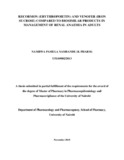| dc.contributor.author | Nambwa, Pamela N | |
| dc.date.accessioned | 2016-04-27T07:07:04Z | |
| dc.date.available | 2016-04-27T07:07:04Z | |
| dc.date.issued | 2015 | |
| dc.identifier.uri | http://hdl.handle.net/11295/95112 | |
| dc.description.abstract | Background
The kidneys are complex organs, and they are vital in maintaining normal body functions. The kidney has two main functions: blood filtration and production of hormones. These hormones help regulate blood pressure (renin), make red blood cells (erythropoietin) and regulate blood calcium levels (Calcitriol). In chronic kidney failure there is reduced production of the hormone erythropoietin which leads to renal anemia. This refers to the reduction in hemoglobin levels due to an absolute reduction of the total number of circulating red blood cells (RBCs arising from chronic renal disease. Current use of recombinant human erythropoietin to ameliorate anemia in patients with chronic renal disease has been very successful and has shown that the primary cause of the anemia found in almost all patients with renal failure is due to a deficiency in the production of erythropoietin. In the month of August 2014 there was a change in products used in management of renal anemia at KNH from erythropoietin beta (Recormon) and Venofer to the biosimilar EPO alpha (Relipoietin) and Ferrose. No study on comparison of treatment outcomes as a result of this change has been conducted.
Objective
To compare the effectiveness of multisource erythropoietin and iron sucrose injections with the branded products in adult patients being treated for renal anemia at Kenyatta National Hospital.
Methodology
This was a descriptive longitudinal hospital-based, retrospective before-after study with two arms, making use of sampled medical records of 140 renal anemia patients at Kenyatta National Hospital renal department. The first arm had 73 patients who were on the original product (Recormon) since August 2012 while the second arm had 67 patients who were on the original product until August 2014 when they were switched to the generic brand (Relipoietin). Ethical approval was granted by Kenyatta National Hospital/University of Nairobi Ethics and Research Committee – P29/01/2015. Files were retrieved and sampled universally for data extraction and data was recorded on a pre-tested data collection form. Descriptive and inferential data analysis was done using Statistical Package for the Social Sciences (SPSS) version 20.
Results
Of the 140 patients enrolled in the study 94 (67.6%) were male. The mean age was 50.46 years (±15.49 [SD]), and 98 (70%) of the patients had been diagnosed with CKD. The most commonly encountered comorbidities were hypertension 87 (33.3%), Diabetes mellitus 80 (30.7%) and concurrent hypertension and diabetes 26 (10.0%). Seventy seven (58.6%) of the sampled population had their hemoglobin increase and, of these, 43(63.2%) were from the Recormon-Recormon (Original brand) arm. There was a marginal but non-significant decrease in the mean hemoglobin levels for those patients who were switched from Recormon to Relipoietin (mean difference = 0.011; 95%CI: -0.26, 0.28). The independent predictors of increased hemoglobin levels were being atenolol-free [OR 6.4 (1.3-32.2)] p value=0.02 and having a diagnosis of CKD [OR 2.3 (1.0-5.2)] p value=0.04.
Conclusion
The patients did not have significantly different mean hemoglobin levels while on Recormon than when switched to Relipoietin. However, it is recommended that clinicians regularly monitor hemoglobin levels when they switch from a reference to a biosimilar erythropoietin product. Health care providers need to be educated on the differences between original and biosimilar erythropoietin to ensure they understand difference in potency or effectiveness and monitor the hemoglobin levels. | en_US |
| dc.language.iso | en | en_US |
| dc.publisher | University of Nairobi | en_US |
| dc.rights | Attribution-NonCommercial-NoDerivs 3.0 United States | * |
| dc.rights.uri | http://creativecommons.org/licenses/by-nc-nd/3.0/us/ | * |
| dc.title | Recormon (erythropoietin) and venofer (iron sucrose) compared to biosimilar products in management of renal anaemia in adults | en_US |
| dc.type | Thesis | en_US |
| dc.description.department | a
Department of Psychiatry, University of Nairobi, ; bDepartment of Mental Health, School of Medicine,
Moi University, Eldoret, Kenya | |



